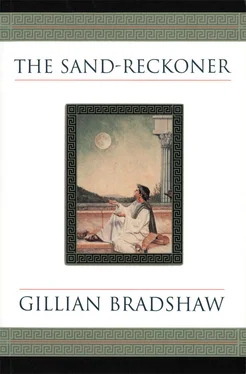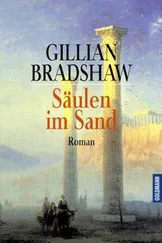Gillian Bradshaw - The Sand-Reckoner
Здесь есть возможность читать онлайн «Gillian Bradshaw - The Sand-Reckoner» весь текст электронной книги совершенно бесплатно (целиком полную версию без сокращений). В некоторых случаях можно слушать аудио, скачать через торрент в формате fb2 и присутствует краткое содержание. Жанр: Исторические приключения, на английском языке. Описание произведения, (предисловие) а так же отзывы посетителей доступны на портале библиотеки ЛибКат.
- Название:The Sand-Reckoner
- Автор:
- Жанр:
- Год:неизвестен
- ISBN:нет данных
- Рейтинг книги:3 / 5. Голосов: 1
-
Избранное:Добавить в избранное
- Отзывы:
-
Ваша оценка:
- 60
- 1
- 2
- 3
- 4
- 5
The Sand-Reckoner: краткое содержание, описание и аннотация
Предлагаем к чтению аннотацию, описание, краткое содержание или предисловие (зависит от того, что написал сам автор книги «The Sand-Reckoner»). Если вы не нашли необходимую информацию о книге — напишите в комментариях, мы постараемся отыскать её.
The Sand-Reckoner — читать онлайн бесплатно полную книгу (весь текст) целиком
Ниже представлен текст книги, разбитый по страницам. Система сохранения места последней прочитанной страницы, позволяет с удобством читать онлайн бесплатно книгу «The Sand-Reckoner», без необходимости каждый раз заново искать на чём Вы остановились. Поставьте закладку, и сможете в любой момент перейти на страницу, на которой закончили чтение.
Интервал:
Закладка:
The customs official considered the concept of a prototype. He could not recollect ever having encountered one before. "It's not dutiable," he decided. "No need to trouble you, then. You're free to go." He nodded toward the nearest gate.
Marcus went to the foot of the luggage chest and picked it up. Archimedes looked round for a porter, saw none, and went to pick up the other end himself- just as Marcus got tired of waiting and set his end down. The soldiers once again nudged each other and laughed. Archimedes' face flushed once more. "Marcus!" he called irritably, bracing the heavy chest against his knee.
But at the name, the soldiers suddenly stopped laughing. "Marcus?" one repeated sharply. Archimedes thought he was the laugher, not the whisperer. He strode forward and stared across the luggage chest at the slave.
Marcus stared back impassively, his hands at his side. "It's what I'm what called," he said evenly.
"That's a Roman name," said the soldier, and it was an accusation.
Archimedes set his own end of the chest down, frowning with a mixture of alarm and disgust. It was clear that a Roman- even an enslaved one- could not be allowed to wander about the city as he pleased. On the other hand, no sensible person would seriously expect to find a Roman as a slave: slavery was the fate that the Romans were accustomed to impose upon others. "Marcus isn't Roman," he declared. "He's some other sort of Italian, from somewhere up north."
"Why does he have a Roman name?" returned the soldier, and Archimedes' alarm and disgust grew as he recognized the accent. Doric, but not Sicilian Doric: that way of swallowing the ends of words was distinct to Tarentum, the city which had once been Taras and the proudest of the Greek cities of southern Italy. A Tarentine in the service of Syracuse had probably fled his own city when the Romans conquered it, and could be relied upon to hate all things Roman. This particular soldier was obviously longing for Marcus to be Roman so that he could punish him.
"Can't help my name," said Marcus mildly. "Lots of Italians with Latin names these days. Comes of being conquered by Romans."
The soldier regarded him with narrowed eyes. "If you're not Roman, what are you?"
"Samnite," replied Marcus promptly. The Samnites had fought three wars with Rome, and rumor had it that despite three crushing defeats and complete subjugation they still hoped for an opportunity to fight a fourth. Not even a Tarentine could object to a Samnite.
This Tarentine, however, proved to be not merely vindictive but well informed. "If you were a Samnite, you'd call yourself Mamertus," he pointed out. "Why the Latin form of the name, if you speak Oscan?"
Archimedes had in fact noticed a Protean quality to Marcus' nationality in the past. The slaver who sold him had called him a Latin, but Marcus himself had sometimes claimed to be a Sabine and sometimes a Marsian. Archimedes had no idea what the truth was- but he knew Latins, Sabines, and Marsians were all part of the Roman alliance. Disgust was swallowed entirely by alarm: Marcus might well be sent to the state quarries for the duration of the war. Given the conditions under which quarry slaves were kept, he'd be lucky to leave them alive. "Marcus is a Samnite," he declared firmly. "And he's been in the family for years. My father bought him when I was nine years old. Do you think I'd smuggle an enemy into my own city? If you want to accuse me of something, do it in front of a magistrate."
The Tarentine gave Archimedes a hard look before turning his assessing stare back on Marcus; Marcus stared back with the same unruffled impassivity he had adopted from the first. The soldier shifted his grip on his spear and commanded, "Say, 'May the gods destroy Rome!' "
Marcus hesitated, then raised both hands to heaven and said loudly, "May the gods destroy Carthage, and grant victory to lovely Syracuse!"
The soldier whipped his spear up and around in a whistling blur; the shaft caught Marcus under his raised arm and knocked him sideways into Archimedes. Archimedes gave a yelp, nearly fell off the quay, and dropped to all fours, skinning his knee on the stones. Marcus fell on top of him with a grunt.
Archimedes was aware of a thick silence as he struggled to get back to his feet. He could feel Marcus on top of him shaking- whether with rage or with fear he couldn't guess. Then the slave's weight shifted and slid off, and Archimedes scrambled up. Marcus remained kneeling on the quay, right hand pressed against his left side where the spear shaft had caught him. Archimedes could feel blood trickling down his own shin. For a moment he was so angry he wanted to hit the soldier: what right did this foreigner have to knock him down on the docks of his own city? He took a deep breath and reminded himself that the soldier was a foreign mercenary, to be treated with great caution; that the soldier was armed and he wasn't; and that he did not want Marcus in trouble. "Why did you do that?" he demanded, struggling to swallow his rage. "He may not have said what you told him to, but he prayed for victory for the city!"
"He prayed for the destruction of Carthage," said the Tarentine. He was flushed now, and a bit breathless: he'd gone further than he'd meant to. Hitting slaves was one thing; knocking over freeborn citizens quite a different one. His comrade and the customs official were staring at him with distaste.
"Don't we all?" said Archimedes. Carthage had been the enemy of Syracuse since the city's founding nearly five centuries before.
"Carthage is our ally," said the soldier.
Archimedes was too astonished even to remember the caution needed with mercenaries. He looked from the Tarentine to the other soldier, then to the customs official. "Carthage?" he repeated disbelievingly.
The other soldier and the official looked embarrassed. "You hadn't heard?" said the official.
Archimedes shook his head numbly. He supposed that, in a way, it was a natural development. Carthage and Syracuse had long fought for the possession of Sicily, and the Carthaginians were undoubtedly as dismayed as the Syracusans by the intrusion onto the island of the rising power of Rome. Perhaps it was right that two old enemies should unite against a new common threat. But- Carthage! Carthage, which had tortured to death the entire male population of the city of Himera; Carthage, which worshiped gods that required her to burn her own children alive; Carthage, the crucifier, the deceiver, the enemy of the Greeks! "Has our tyrant really sworn a treaty with Carthage?" he asked.
"Our king," the Tarentine corrected him quickly. "He calls himself king now."
Archimedes just blinked. "Tyrant" to a Syracusan was the natural title for an absolute ruler: it implied no condemnation. If Syracuse's present tyrant wanted to call himself a king, that was his right, but it seemed a bit pointless.
"King Hieron hasn't sworn anything," the official said defensively.
"He's no fool," added the second soldier, for the first time speaking above a whisper and revealing his own accent- to Archimedes' relief- as the inimitable growl of the back streets of Syracuse. "If Carthage wants to help our shining city against Rome, she's welcome to, but King Hieron won't trust that sackarsed lot, and I say, well done! He's agreed to a joint military operation against the Romans, nothing more." He gave the Tarentine a disgusted look: it was quite clear that he thought that a prayer for the destruction of Carthage in no way deserved a blow.
Marcus grunted, and Archimedes remembered what he was supposed to be doing. "We hadn't heard anything about this alliance in Egypt," he said stiffly. "I'm sorry if Marcus offended you, but he thought he was praying for a Syracusan victory."
The official and the Syracusan soldier both nodded, accepting the explanation, relieved that Archimedes had tacitly agreed to forget the blow. The Tarentine, however, only scowled. Marcus might have prayed for a Syracusan victory, but he had not prayed for the destruction of Rome. The man's dark eyes returned to the slave, who was still kneeling on the quay, head bowed, rubbing his bruise. Something flickered behind the scowl: the desire to hurt and humiliate.
Читать дальшеИнтервал:
Закладка:
Похожие книги на «The Sand-Reckoner»
Представляем Вашему вниманию похожие книги на «The Sand-Reckoner» списком для выбора. Мы отобрали схожую по названию и смыслу литературу в надежде предоставить читателям больше вариантов отыскать новые, интересные, ещё непрочитанные произведения.
Обсуждение, отзывы о книге «The Sand-Reckoner» и просто собственные мнения читателей. Оставьте ваши комментарии, напишите, что Вы думаете о произведении, его смысле или главных героях. Укажите что конкретно понравилось, а что нет, и почему Вы так считаете.












